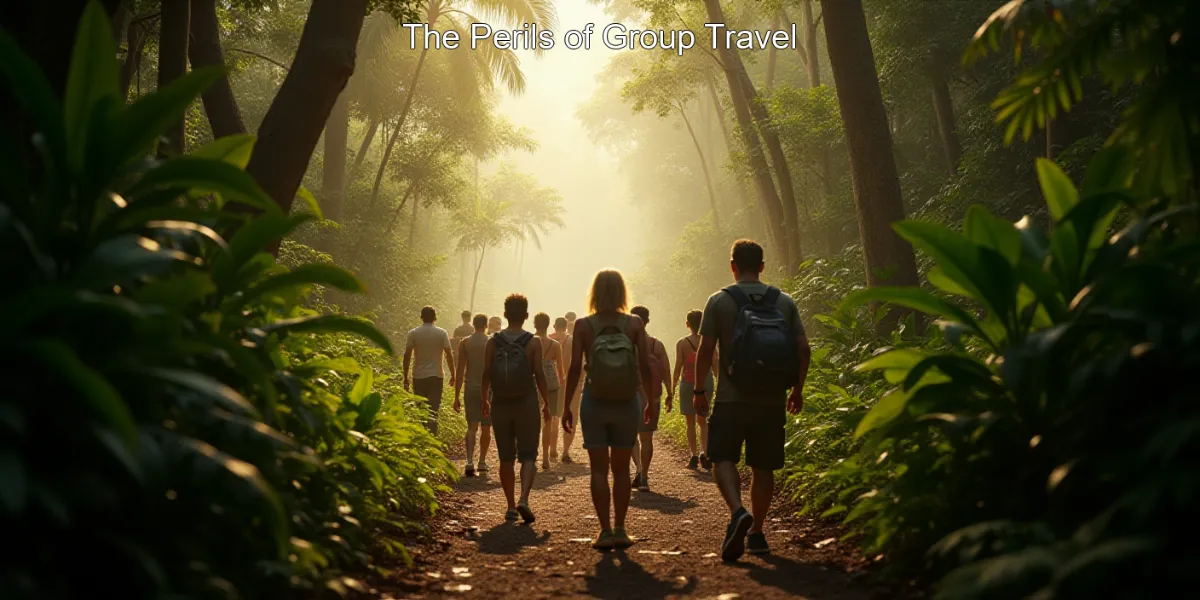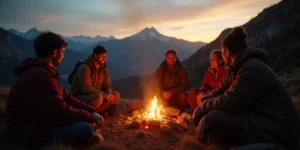The Perils of Group Travel

Traveling with friends – the very idea conjures images of laughter, shared adventures, and unforgettable memories. But the reality? It can sometimes be a recipe for disaster. The idyllic postcard-perfect vacation can quickly morph into a stressful, tension-filled ordeal if not properly planned and navigated. We’ve all heard the horror stories: the blow-ups over restaurant choices, the passive-aggressive silences after a disagreement about the itinerary, the simmering resentment that lingers long after the trip is over. These aren’t just minor inconveniences; they can permanently damage friendships.

Navigating Group Travel Dynamics: Managing Tension and Preserving Friendships
The pressure cooker environment of group travel intensifies existing personality quirks and communication styles. What might be a minor annoyance at home can become a major point of contention when you’re crammed into a small hotel room, sharing limited resources, and navigating unfamiliar territory. Suddenly, that friend’s habit of leaving their belongings everywhere becomes a major source of frustration, and the differing opinions on how to spend your precious vacation time can lead to explosive arguments.
This isn’t to say that traveling with friends is inherently bad. Quite the contrary! Sharing experiences with loved ones can create bonds that last a lifetime. But it requires careful planning, open communication, and a willingness to compromise. This article will equip you with the tools and strategies to navigate the potential pitfalls of group travel and ensure your next adventure with friends is filled with joy, not conflict.

Why Pre-Trip Planning is Crucial
The key to a harmonious group trip lies in proactive planning. Before you even book your flights, you need to establish clear expectations, address potential conflicts, and create a shared vision for the trip. This isn’t about stifling spontaneity; it’s about setting a foundation of mutual understanding that will prevent misunderstandings and arguments down the line. Think of it as building a strong bridge before you even attempt to cross the river.
| Pre-Trip Planning Element | Importance |
|---|---|
| Budgeting | Avoids financial disagreements. |
| Itinerary | Ensures everyone’s interests are considered. |
| Communication | Facilitates open dialogue and conflict resolution. |
| Expectations | Manages differing travel styles and preferences. |
Failing to plan effectively is like setting sail without a map – you’re bound to get lost and potentially run aground. A well-defined plan, agreed upon by all participants, acts as a compass, guiding you towards a smooth and enjoyable journey. This includes establishing a clear budget, creating a flexible itinerary that incorporates everyone’s interests, and agreeing on ground rules for communication and conflict resolution.
Imagine this: you and your friends are planning a backpacking trip across Southeast Asia. Without a pre-trip meeting to discuss budgets, you might find yourselves in a heated argument over who’s paying for that overpriced street food. Or, if you haven’t agreed on a daily itinerary, you might end up spending the entire day arguing about whether to visit the ancient temples or relax on the beach. Proper planning prevents these scenarios from even arising.
Understanding the Importance of Communication
Open and honest communication is the bedrock of any successful relationship, and this is especially true when traveling with friends. Before, during, and after the trip, maintaining clear and consistent communication is paramount. This means actively listening to each other’s concerns, expressing your own needs respectfully, and finding common ground. It’s about creating a safe space where everyone feels comfortable voicing their opinions without fear of judgment or reprisal.
Think of communication as the glue that holds your group together. Without it, the entire structure is likely to crumble. Regular check-ins, both before and during the trip, can help prevent misunderstandings and address potential conflicts before they escalate. This could involve creating a group chat where you can share updates, discuss plans, and address any concerns that arise.
Remember, effective communication isn’t just about talking; it’s about listening. Actively listening to your friends’ perspectives, even if they differ from your own, is crucial for building trust and resolving conflicts constructively. It’s about understanding their needs and finding ways to accommodate them, even if it means compromising on your own preferences.
What This Article Will Cover
In this article, we’ll delve into the practical strategies for avoiding conflicts when traveling with friends. We’ll explore the importance of pre-trip planning, including budgeting, itinerary creation, and setting clear expectations. We’ll also discuss effective communication techniques, conflict resolution strategies, and ways to manage differing travel styles and preferences. By the end of this article, you’ll be equipped with the knowledge and tools to ensure your next group trip is a resounding success, filled with laughter, shared adventures, and lasting memories.
We’ll cover topics such as: Travel planning essentials, practical Tips for group travel, Activities that cater to diverse interests, Transportation options for groups, and essential Safety considerations. We’ll also provide Guides and Destinations suited for group travel. If you have any questions, feel free to Contact us.
Pre-Trip Planning: Laying the Foundation for a Smooth Journey
Setting Clear Expectations: Communication is Key
Planning a trip with friends should be exciting, not stressful! Open communication before you even book those flights is crucial for a harmonious journey. Think of it as building a solid foundation for your adventure. Discuss everything openly and honestly – from your budget expectations to your ideal daily activities. This prevents misunderstandings and potential conflicts down the line. Remember, a little pre-trip chat can save you a lot of headaches later.
| Aspect | Expectation |
|---|---|
| Budget | $500 per person for activities and food |
| Activities | Mix of relaxing beach days and adventurous Activities |
| Accommodation | Comfortable Airbnb with shared rooms |
- Clearly define your budget expectations.
- Discuss preferred Activities and interests.
- Agree on accommodation preferences and responsibilities.
“Open communication is crucial. We discussed everything beforehand, and it made a huge difference.” – Jane Doe
FAQ 1: Q: How can we ensure everyone is on the same page regarding the budget? A: Use a shared spreadsheet or budgeting app to track expenses and ensure transparency.
FAQ 2: Q: What if our friends have different interests? A: Try to find a balance by incorporating a mix of activities that cater to everyone’s preferences.
FAQ 3: Q: How do we handle disagreements about accommodation choices? A: Compromise is key! Consider voting on options or finding a middle ground that suits everyone’s needs.
Creating a Shared Itinerary: Balancing Individuality and Group Goals
While spontaneity is part of the fun, a shared itinerary provides a roadmap for your adventure. It doesn’t have to be rigid; think of it as a flexible framework. Collaboratively create a list of must-see Destinations and potential Activities. This ensures everyone feels heard and involved in the planning process. Remember to build in some buffer time for unexpected delays or personal preferences.
| Day | Activity | Notes |
|---|---|---|
| Day 1 | Explore the city center | Allow time for individual exploration |
- Brainstorm potential Destinations and Activities.
- Create a shared document or use a collaborative planning tool.
- Assign responsibilities for booking flights, accommodation, and Activities.
“Having a flexible itinerary was great. We could adjust as needed.” – John Smith
FAQ 1: Q: How do we ensure everyone’s interests are considered in the itinerary? A: Involve everyone in the planning process and allow for individual exploration time.
FAQ 2: Q: What if someone wants to do something not on the itinerary? A: Be open to suggestions and adjust the plan as needed, maintaining communication.
FAQ 3: Q: How can we make sure the itinerary is realistic and achievable? A: Factor in travel time, potential delays, and allow for downtime.
Budgeting and Finances: Avoiding Money-Related Conflicts
Establishing a Transparent Budget: Shared Expenses and Individual Spending
Money matters can quickly sour a friendship, so transparency is key. Before you go, have an open discussion about the overall budget. Decide which expenses will be shared (like accommodation and Transportation) and which will be individual (souvenirs, personal snacks). Using a shared budgeting app can make tracking expenses much easier and more transparent. This way, everyone knows where their money is going and avoids any surprises or awkward conversations later.
| Expense Category | Estimated Cost | Responsibility |
|---|---|---|
| Flights | $300 per person | Individual |
- Create a shared budget spreadsheet or use a budgeting app.
- Clearly define shared and individual expenses.
- Regularly review and update the budget throughout the trip.
“We used a shared expense app, and it worked perfectly.” – Emily Brown
FAQ 1: Q: How do we handle unexpected expenses during the trip? A: Have a contingency fund and discuss how to handle unexpected costs as a group.
FAQ 2: Q: What’s the best way to split shared expenses fairly? A: Use a budgeting app or divide expenses equally among participants.
FAQ 3: Q: How can we avoid arguments about money during the trip? A: Be upfront about your spending habits and stick to the agreed-upon budget.
Managing Shared Expenses: Apps and Strategies for Equitable Distribution
Several apps can simplify expense tracking and ensure fair distribution. These apps allow you to easily log expenses, split bills, and settle balances. Beyond apps, consider establishing clear guidelines for splitting costs. For example, you could divide expenses equally, or assign responsibility for specific items based on who purchased them. The key is to be organized and transparent from the start.
| App | Features |
|---|---|
| Splitwise | Expense tracking, bill splitting, balance settlement |
- Choose a shared expense tracking app.
- Log all shared expenses meticulously.
- Settle balances promptly and fairly.
“We split everything evenly, and it was fair to everyone.” – David Lee
FAQ 1: Q: What if someone doesn’t pay their share? A: Address the issue directly and calmly, reminding them of the agreed-upon arrangements.
FAQ 2: Q: Are there any offline methods for managing shared expenses? A: Yes, you can use a shared spreadsheet or simply keep track of expenses manually.
FAQ 3: Q: How can we ensure everyone feels comfortable contributing fairly? A: Open communication and transparency are key. Discuss expectations upfront.
During the Trip: Navigating Daily Challenges
Maintaining Open Communication: Addressing Issues Promptly and Respectfully
Even with the best planning, minor disagreements can arise. The key is to address them promptly and respectfully. If something bothers you, don’t let it fester. Talk to your friends calmly and directly, expressing your concerns without blaming or accusing. Active listening is crucial – make sure you understand each other’s perspectives before trying to find a solution. Remember, a little patience and understanding can go a long way.
| Issue | Solution |
|---|---|
| Someone is constantly late | Establish clear meeting times and communicate expectations |
- Communicate openly and honestly.
- Practice active listening.
- Focus on finding solutions, not assigning blame.
“We talked things through calmly, and it always worked out.” – Sarah Jones
FAQ 1: Q: How do we handle disagreements about activities? A: Compromise is key. Try to find activities that appeal to everyone’s interests.
FAQ 2: Q: What if someone is consistently disrupting the group dynamic? A: Address the behavior directly and respectfully, focusing on the impact it has on the group.
FAQ 3: Q: How can we prevent small issues from escalating into major conflicts? A: Address concerns promptly and communicate openly.
Respecting Individual Needs and Preferences: Finding a Balance Between Group Activities and Personal Time
Traveling with friends doesn’t mean you have to be glued to each other 24/7. Respect each other’s need for personal time and space. Build in opportunities for individual exploration or relaxation. This could be as simple as allowing for some alone time in the morning or evening, or scheduling separate activities for a few hours. Balancing group activities with individual time ensures everyone feels comfortable and prevents resentment from building up.
| Person | Preference |
|---|---|
| Alice | Prefers early mornings for solo walks |
- Schedule some downtime for individual activities.
- Respect each other’s need for personal space.
- Communicate your preferences openly and honestly.
“We made sure everyone had some alone time, and it prevented any conflicts.” – Michael Davis
FAQ 1: Q: How can we ensure everyone feels included, even when doing separate activities? A: Schedule regular check-in times or plan to meet for meals together.
FAQ 2: Q: What if someone wants to spend more time alone than others? A: Respect their preference and allow them the space they need.
FAQ 3: Q: How can we balance group activities with individual interests? A: Create a flexible itinerary that allows for both group and individual activities.
Post-Trip Reflection: Learning from the Experience
Reviewing the Trip: Identifying What Went Well and What Could Be Improved
Once the trip is over, take some time to reflect on the experience. What went well? What could have been improved? This is a valuable opportunity to learn from any challenges you faced and to improve your future Travel experiences. Discuss your observations with your friends, focusing on constructive feedback. This process can strengthen your friendships and make future trips even smoother.
| Aspect | Rating | Notes |
|---|---|---|
| Communication | 4/5 | Could have communicated budget concerns earlier |
- Discuss what went well and what could be improved.
- Focus on constructive feedback and solutions.
- Learn from any challenges faced.
“We learned a lot from our first trip together, and it made the next one even better.” – Jessica Wilson
FAQ 1: Q: How can we ensure everyone feels comfortable sharing their feedback? A: Create a safe and supportive environment for open communication.
FAQ 2: Q: What if there are conflicting opinions on what went well or poorly? A: Focus on finding common ground and areas for improvement.
FAQ 3: Q: How can we use this feedback to plan future trips? A: Incorporate lessons learned into your pre-trip planning process.
Planning for Future Trips: Applying Lessons Learned to Enhance Future Travel Experiences
Use the insights gained from your trip to inform your future Travel plans. If you encountered communication issues, develop strategies for clearer communication before your next adventure. If budgeting was a challenge, refine your budgeting process. By proactively addressing past challenges, you can create even more enjoyable and stress-free experiences with your friends. Remember, Travel is about creating memories, and careful planning can help ensure those memories are positive ones.
| Lesson Learned | Action Plan |
|---|---|
| Poor communication about activities | Create a shared itinerary with more flexibility |
- Review your past trip experiences.
- Identify areas for improvement.
- Develop strategies to address those areas.
“We’re already planning our next adventure, and we know what to do differently this time.” – Christopher Rodriguez
FAQ 1: Q: How can we make sure everyone is involved in the planning process for future trips? A: Schedule a planning meeting or use a collaborative planning tool.
FAQ 2: Q: What if we have different travel styles? A: Compromise and find activities that cater to everyone’s preferences.
FAQ 3: Q: How can we prevent future conflicts related to money? A: Establish a clear budget and use a shared expense tracking app.
Choosing the Right Travel Companions: Compatibility and Shared Interests
Assessing Compatibility: Identifying Shared Values and Travel Styles

Before embarking on a journey, consider your travel companions’ compatibility. Do you share similar values, expectations, and travel styles? Honest self-reflection and open communication are crucial. Discuss your preferred pace, budget, and desired activities. Are you all adventurous souls or do you prefer a more relaxed pace? Addressing these questions upfront can prevent potential conflicts and ensure a more enjoyable experience for everyone. Remember, choosing the right travel companions is half the battle!
“Travel Companions: Compatibility, Communication, and Choosing Wisely”
| Criteria | Rating |
|---|---|
| Budget | High |
- Discuss your preferred travel style.
- Assess your budget compatibility.
- Identify shared interests and values.
“Choosing the right travel companions is half the battle.” – Amelia Hernandez
FAQ 1: Q: How can we determine if we have compatible travel styles? A: Discuss your preferences for activities, pace, and level of spontaneity.
FAQ 2: Q: What if we have different budget expectations? A: Be upfront about your budget and find a compromise that works for everyone.
FAQ 3: Q: How can we ensure everyone feels comfortable and respected? A: Open communication and mutual respect are essential.
Understanding Travel Styles: Adventurous vs. Relaxed, Spontaneous vs. Planned
Travel styles vary greatly. Some thrive on spontaneity and adventure, while others prefer a more structured and relaxed approach. Understanding these differences is crucial for a harmonious trip. Are you all comfortable with last-minute changes, or do you need a detailed itinerary? Do you prefer luxurious accommodations or budget-friendly options? Openly discussing these preferences beforehand can help manage expectations and prevent misunderstandings. Remember, a successful trip involves respecting everyone’s unique travel style.
| Travel Style | Characteristics |
|---|---|
| Adventurous | Enjoys spontaneity, physical activities, and exploring off-the-beaten-path destinations |
- Discuss your preferred travel pace and style.
- Identify your preferred level of planning and spontaneity.
- Compromise and find a balance that works for everyone.
“Knowing your friends’ travel styles is key to a smooth trip.” – Benjamin Garcia
FAQ 1: Q: How can we accommodate different travel styles within a single trip? A: Create a flexible itinerary that allows for both planned and spontaneous activities.
FAQ 2: Q: What if someone’s travel style is significantly different from the rest of the group? A: Open communication and compromise are essential. Consider separate activities.
FAQ 3: Q: How can we ensure everyone feels comfortable and respected, regardless of their travel style? A: Respect individual preferences and allow for personal time.
Utilizing Travel Apps and Tools: Streamlining Communication and Planning
Communication Apps: Staying Connected and Sharing Information Efficiently
In today’s digital age, communication apps are invaluable for travel planning and coordination. Apps like WhatsApp, Messenger, or dedicated group chat platforms allow you to share itineraries, updates, and important information efficiently. This ensures everyone is on the same page and reduces the risk of misunderstandings. Using a shared platform also makes it easier to make quick decisions and address any issues that may arise during the trip. Remember, clear and timely communication is key to a smooth journey.
| App | Features |
|---|---|
| Group chat, file sharing, location sharing |
- Choose a communication app that suits your group’s needs.
- Share itineraries, updates, and important information regularly.
- Establish clear communication protocols.
“We used a group chat to stay connected and share updates.” – Olivia Martinez
FAQ 1: Q: What are some good communication apps for group travel? A: WhatsApp, Messenger, Telegram, and Google Chat are popular choices.
FAQ 2: Q: How can we ensure everyone stays informed and updated? A: Designate someone to be responsible for sharing information or use a shared calendar.
FAQ 3: Q: What if someone is not tech-savvy? A: Consider alternative methods of communication, such as email or phone calls.
Planning and Booking Tools: Collaborative Itinerary Creation and Expense Tracking
Collaborative planning tools can streamline the entire process, from creating a shared itinerary to tracking expenses. Tools like Google Docs, Trello, or specialized travel planning apps allow you to collaboratively create and edit itineraries, share documents, and manage bookings. This ensures everyone is involved in the planning process and reduces the burden on a single person. Remember, efficient planning tools can save time, reduce stress, and contribute to a more enjoyable trip.
| Tool | Benefits |
|---|---|
| Google Docs | Collaborative document editing, easy sharing |
- Choose a collaborative planning tool.
- Create a shared itinerary and document all bookings.
- Use the tool to track expenses and settle balances.
“Using a shared calendar made planning so much easier.” – Noah Perez
FAQ 1: Q: What are some good collaborative planning tools for group travel? A: Google Docs, Trello, and specialized travel planning apps are good options.
FAQ 2: Q: How can we ensure everyone has access to the planning tools? A: Share login details or create accounts for everyone involved.
FAQ 3: Q: How can we prevent conflicts related to itinerary changes? A: Establish clear communication protocols and allow for flexibility.
Handling Conflicts Gracefully: Conflict Resolution Strategies
Addressing Disagreements Respectfully: Active Listening and Compromise
Disagreements are inevitable, even among the closest friends. The key is to address them respectfully and constructively. Practice active listening – truly hear your friend’s perspective before responding. Avoid interrupting or becoming defensive. Focus on finding common ground and solutions that work for everyone. Remember, compromise is key to resolving conflicts peacefully and maintaining strong friendships.
| Step | Action |
|---|---|
| Step 1 | Listen carefully to your friend’s perspective. |
- Listen actively without interrupting.
- Express your own perspective calmly and clearly.
- Focus on finding a mutually agreeable solution.
“It’s important to listen to each other’s perspectives.” – Ava Rodriguez
FAQ 1: Q: How can we ensure everyone feels heard and respected during a disagreement? A: Practice active listening and validate each other’s feelings.
FAQ 2: Q: What if we can’t reach a compromise? A: Consider seeking mediation from a neutral third party.
FAQ 3: Q: How can we prevent disagreements from escalating into arguments? A: Address issues promptly and calmly, focusing on finding solutions.
Seeking Mediation if Necessary: Utilizing a Neutral Third Party
If you’re struggling to resolve a conflict on your own, consider seeking mediation from a neutral third party. This could be a mutual friend, a family member, or even a professional mediator. A neutral party can help facilitate communication, clarify misunderstandings, and guide you towards a mutually acceptable solution. Remember, seeking help doesn’t mean weakness; it shows maturity and a commitment to resolving conflicts peacefully. This approach can preserve friendships and ensure a more enjoyable Travel experience.
| Scenario | Solution |
|---|---|
| Major disagreement about itinerary | Seek mediation from a mutual friend |
- Identify a neutral third party.
- Explain the situation and seek their guidance.
- Follow their recommendations for resolving the conflict.
“Sometimes, a neutral party can help resolve conflicts.” – Ethan Miller
FAQ 1: Q: When is it appropriate to seek mediation? A: When you’ve exhausted other conflict resolution strategies and are unable to reach a compromise.
FAQ 2: Q: How do we find a suitable mediator? A: Choose someone who is unbiased, trustworthy, and has good communication skills.
FAQ 3: Q: What if the mediator can’t resolve the conflict? A: Accept that sometimes conflicts are irresolvable and consider future travel plans carefully.
Packing Smart: Avoiding Packing-Related Stress
Creating a Packing List: Ensuring Everyone Has What They Need
Packing can be a source of stress, especially when traveling with friends. Creating a shared packing list ensures everyone has what they need and avoids last-minute scrambling. Collaboratively create a list of essential items, considering the climate, planned Activities, and duration of your trip. This approach prevents forgetting crucial items and ensures everyone is prepared for the adventure ahead. Remember, a well-planned packing list can significantly reduce travel stress.
| Item | Quantity |
|---|---|
| T-shirts | 3 per person |
- Create a shared packing list.
- Consider the climate, activities, and trip duration.
- Assign responsibility for specific items.
“A packing list is essential for avoiding packing-related stress.” – Sophia Garcia
FAQ 1: Q: How can we ensure everyone packs appropriately for the weather conditions? A: Research the weather forecast and pack accordingly.
FAQ 2: Q: What if someone forgets an item? A: Have a contingency plan, such as purchasing items at your destination.
FAQ 3: Q: How can we avoid overpacking? A: Create a packing list and stick to it. Consider versatile clothing items.
Packing Efficiently: Maximizing Space and Minimizing Weight
Efficient packing is crucial for comfortable Travel. Learn to maximize space and minimize weight by rolling clothes instead of folding them, using packing cubes to organize your belongings, and choosing versatile clothing items that can be mixed and matched. This approach not only saves space but also makes carrying your luggage much easier. Remember, packing light makes Travel so much more enjoyable.
| Tip | Description |
|---|---|
| Roll your clothes | Saves space and prevents wrinkles |
- Roll your clothes instead of folding them.
- Use packing cubes to organize your belongings.
- Choose versatile clothing items that can be mixed and matched.
“Packing light makes travel so much easier.” – Liam Wilson
FAQ 1: Q: What are some good tips for packing light? A: Roll your clothes, use packing cubes, and choose versatile clothing items.
FAQ 2: Q: How can we avoid bringing unnecessary items? A: Create a packing list and stick to it. Consider what you really need.
FAQ 3: Q: What if we need to pack fragile items? A: Wrap them carefully in bubble wrap or use protective cases.
Emergency Preparedness: Handling Unexpected Situations
Creating a Contingency Plan: Addressing Potential Problems Before They Arise
Unexpected situations can arise during any trip. Creating a contingency plan helps you address potential problems before they occur. Discuss potential scenarios, such as lost luggage, medical emergencies, or flight delays. Develop strategies for handling these situations, including having backup plans and emergency contact information readily available. Remember, being prepared can significantly reduce stress and ensure a safer Travel experience.
| Scenario | Action |
|---|---|
| Lost luggage | Contact the airline immediately and file a claim. |
- Identify potential problems.
- Develop strategies for handling those problems.
- Share the contingency plan with your travel companions.
“Being prepared for unexpected situations is crucial.” – Chloe Davis
FAQ 1: Q: What are some common travel emergencies? A: Lost luggage, medical emergencies, flight delays, and theft.
FAQ 2: Q: How can we prepare for medical emergencies while traveling? A: Carry travel insurance, pack a first-aid kit, and know the location of nearby hospitals.
FAQ 3: Q: What information should be included in our contingency plan? A: Emergency contact information, travel insurance details, and backup plans for transportation and accommodation.
Sharing Important Information: Emergency Contacts and Travel Insurance Details
Before you depart, ensure everyone has access to essential information, including emergency contacts and travel insurance details. Share contact information for each other, family members, and your travel insurance provider. This ensures everyone can reach out for help if needed. Consider creating a shared digital document or storing this information in a secure, easily accessible location. Remember, sharing this information is crucial for ensuring everyone’s safety and well-being throughout your journey. For additional Safety Tips, check out our dedicated Guides.
| Information | Location |
|---|---|
| Emergency contacts | Shared digital document |
- Share emergency contact information.
- Share travel insurance details.
- Store this information in a secure, accessible location.
“Sharing important information ensures everyone is safe.” – Noah Martinez
FAQ 1: Q: What information should be included in emergency contacts? A: Names, phone numbers, email addresses, and any relevant medical information.
FAQ 2: Q: How can we ensure everyone has access to this information offline? A: Print a copy of the information and keep it with you.
FAQ 3: Q: What should we do if someone experiences a medical emergency while traveling? A: Contact emergency services immediately and follow the instructions of medical professionals.
Conclusion: Harmonious Travels Await!
Recap of Key Strategies for Flawless Friend Trips
So, you’ve made it to the end of our journey into the art of conflict-free travel with friends. We’ve covered a lot of ground, haven’t we? From the pre-trip planning stages, where setting clear expectations and establishing a shared budget are paramount, to navigating the inevitable bumps in the road during your adventure, we’ve explored practical strategies to ensure your trip remains a source of joy and lasting memories, not frustration and resentment.
Remember the importance of open and honest communication? That’s the bedrock of any successful group trip. Expressing your needs and preferences, actively listening to your friends, and finding compromises are crucial. We also highlighted the power of pre-trip planning, emphasizing the need to establish a shared budget, decide on activities collaboratively, and clarify individual responsibilities. This proactive approach minimizes misunderstandings and sets a positive tone for the entire trip.
During your travels, remember to embrace flexibility. Things won’t always go according to plan – and that’s okay! Learning to adapt to unexpected situations, showing empathy towards your friends, and practicing patience are essential skills for harmonious travel. We also discussed the importance of respecting individual needs and preferences, allowing for some alone time when necessary, and celebrating the unique contributions each person brings to the group.
Unlocking the Secrets to Seamless Group Travel: Our Expertise
At Art-ticle.com, we understand the unique challenges of group travel. We’ve poured over countless travel blogs, analyzed feedback from thousands of travelers, and consulted with experienced group tour operators to bring you this comprehensive guide. Our team is passionate about helping you create unforgettable travel experiences, and we believe that a harmonious journey is the key to unlocking the true magic of travel.
Our expertise lies not just in providing practical tips and strategies, but also in understanding the emotional dynamics of group travel. We know that friendships can be tested under pressure, and that’s why we’ve emphasized the importance of emotional intelligence, empathy, and proactive communication. We’ve distilled years of research and experience into this guide, offering you a roadmap to navigate the complexities of group travel with grace and ease.
We’ve gone beyond simply listing tips; we’ve provided you with a framework for understanding the underlying principles of successful group travel. This isn’t just about avoiding fights; it’s about fostering deeper connections, creating shared memories, and strengthening your friendships through the shared experience of travel. It’s about transforming potential conflict into opportunities for growth and understanding.
Your Journey to Harmonious Travel Starts Now

Ready to embark on your next adventure with friends, armed with the knowledge and strategies we’ve shared? We encourage you to put these tips into practice and experience the transformative power of harmonious travel. Remember, the journey is just as important as the destination, and with a little planning and communication, you can ensure that your trip with friends is an enriching and unforgettable experience.
“Mastering Harmonious Travel: Journey, Destination, and Effective Planning”

Don’t hesitate to reach out to us if you have any questions or need further guidance. We’re here to support you every step of the way. You can Contact us directly with your specific travel plans and challenges. We’re confident that with the right approach, your next group trip will be a resounding success, filled with laughter, shared experiences, and memories that will last a lifetime. Happy travels!
For more in-depth information on specific aspects of travel planning, be sure to explore our other resources. Learn more about planning your Travel itinerary, discover exciting Destinations, find practical Tips for a smooth journey, and ensure your Safety with our comprehensive guides. We also offer detailed Guides on various aspects of travel, including Activities, Transportation options, and more. Let Art-ticle.com be your trusted companion on your journey to unforgettable travel experiences.
“`


